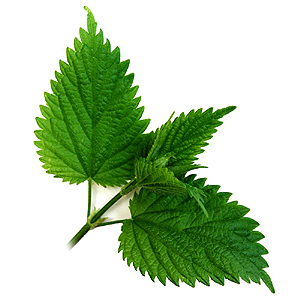No products
Stinging nettle leaves - 50g
(Herba Urticae dioicae)
Français: Ortie dioique ~ Español: Ortiga mayor ~ Русский: Крапива двудомная
Stinging nettle (Urtica dioica) acts as a cardiotonicum, antidiabetic in lighter forms of diabetes, when it is not necessary to inject the insulin, anti-diarrheic, antiviral especially against flu viruses...
![]()
Content |   |
Binomial nameUrtica dioica Commonly called (often known as)common nettle, stinging nettle, nettle leaf or just a nettle or stinger StorageStore in a dry place at a temperature up to 25°C |
Description of herb
Stinging nettle (Urtica dioica) will grow everywhere, even where we do not need it. However, this is what proves its resilience, tenacity and vitality, which we can use for ourselves and our health.
It is therefore widely used as a medicinal herb and as an important part of the diet in small poultry farming. Both stem (Herba urticae) and root (Radix urticae) are collected for medicinal purposes. It can be collected from spring to September, but preferably only until mid-May, when it is most effective. It is dried in the shade and as quickly as possible.
Healing effects
The active substances contain only nettles harvested before 15 May. The effects and uses of nettle in medicine are very diverse: Tonic, metabolic, diuretic, antidiabetic, obstipant, antidiarrheal, hemostatic, hepatic, antianemic, cardiotonic, antiviral, vulnearium, bronchospasmolytic, antirheumatic.
Chlorophyll has an stimulating effect on metabolism and at the same time acts against anemia, it also acts as an anti-rheumatic drug, anti-inflammatory, deodorant and accelerates wound healing.
Nettle drug also acts as a cardiotonic, antidiabetic (for milder forms of diabetes, when it is not necessary to inject insulin), antidiarrheal, antiviral (especially against flu viruses), supports the activity of the pancreas and ovaries, helps with bronchial asthma, acts as a diuretic, stops bleeding, improves blood circulation to internal organs, has also proven itself in diseases of the liver, gallbladder and kidneys and as a means of supporting the production of breast milk.
Nettle root helps with prostate enlargement, if it is not cancer (benign prostate enlargement when the prostate enlarges and narrows the urethra). However, the diagnosis must be made by a doctor. Nettle root can slow down prostate growth.
Vitamin K promotes blood formation and is anti-bleeding.
Nettles contain 2x more vitamin C than lemons and calcium up to 25%. Silicic acid increases the elasticity of blood vessels.
The root contains a large amount of tannins, so the extract from it is used as gargles in bleeding gums or as a bath additive against increased sebum production.
Externally against hair loss (cook a handful in 0.5 l of wine vinegar for 10 minutes and the decoction thus obtained is rubbed into the scalp daily).
Active substances
Nettle contains minerals, calcium, sodium, phosphorus, potassium, magnesium, silicon, iron, sulfur, chlorine, protein, vitamin B2, vitamin D, vitamin E, vitamin K, vitamin C, silicic acid, chlorophyll, carbohydrates, phytoncides, tannins , carotenes, acetylcholine, histamine, serotonin, flavonoids, formic acid, amino acids, alanine, arginine, asparagine, phenylalanine, isoleucine, lucin, thyroxine, valine, lecithin, polysaccharides, sitosterol, sitopsterol glucosides, scopoletin, fatty acids.
Properties
Analgesic, cardiotonic, antidiabetic, anti-inflammatory, antiallergen, antianaphylactic, antirheumatic, antiasthmatic, anticonvulsant, anti-dandruff, antihistamine, astringent, diuretic, hemorrhage, immunomodulator, prostatic tonic, stimulating tonic.
Recommended at
Seasonal allergies, arthritis, bronchitis, bursitis, gingivitis, laryngitis, prostatitis, rhinitis, sinusitis, tendonitis, BPH, rheumatism and other inflammatory conditions. High blood pressure, hair loss, anemia, excessive menstruation, hemorrhoids, eczema, gout, sciatica, neuralgia, Alzheimer's disease, asthma, bladder infections, urticaria, kidney stones, multiple sclerosis, PMS, prostate enlargement and sciatica.
Nettles can lower blood pressure and heart rate. It can also lower blood sugar. While this can be beneficial if you are on a set dose of diabetic medication, your blood sugar level may end up too low due to the combined effect of your medication and nettle.
Preparation and dosing
TEA
Preparation: Pour 0.25 l of boiling water over 1 tablespoon of dried leaves and let it infuse for 10 minutes.
Dosing: 3 times a day as a diuretic for swelling, urinary tract diseases, rheumatism, liver and gallbladder diseases.
BATH
Preparation: 3 tablespoons per 1 liter of cold water, cook for 5 minutes, let it infuse for 10 minutes, pour into the bath.
Usage: Total or sedentary baths in rheumatism, washing in shin ulcers and itchy rashes.
Side effects
Nettle can be used for a long time and without any contraindications.
REMEMBER: Tell all your health care providers about any complementary health practices you use. Give them a full picture of what you do to manage your health. This will help ensure coordinated and safe care.

